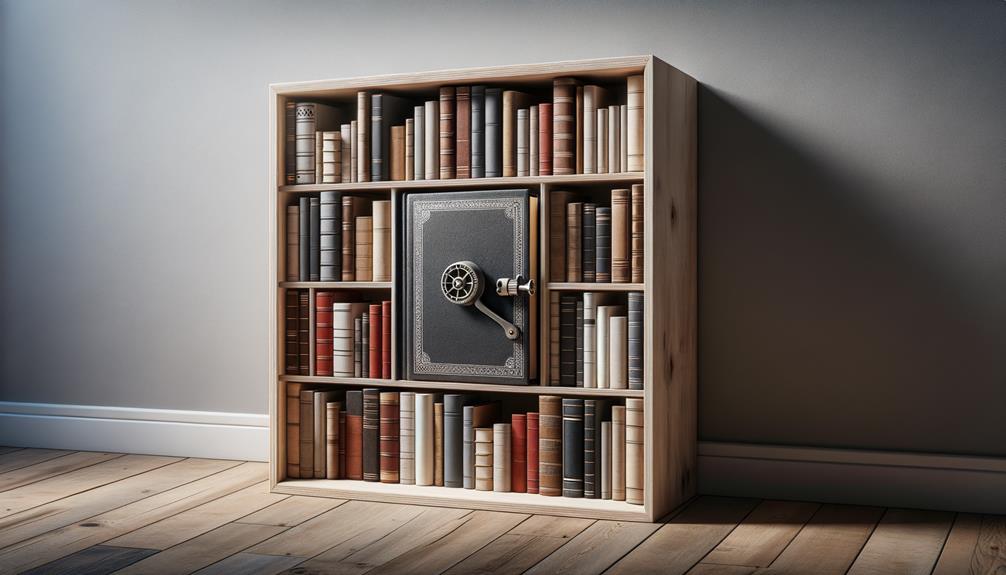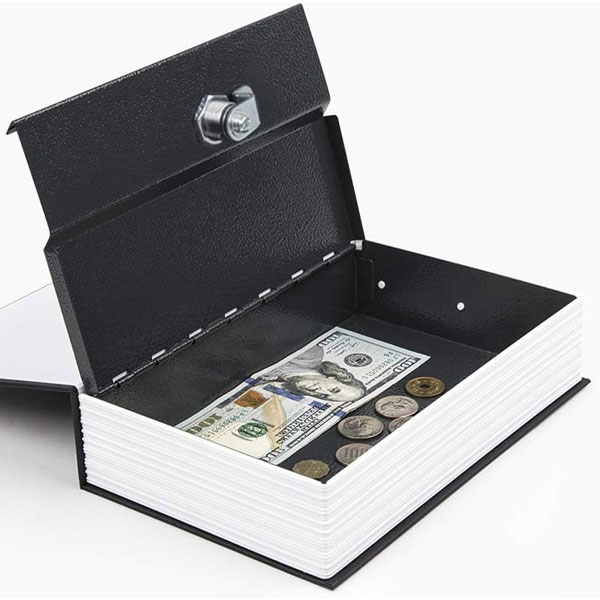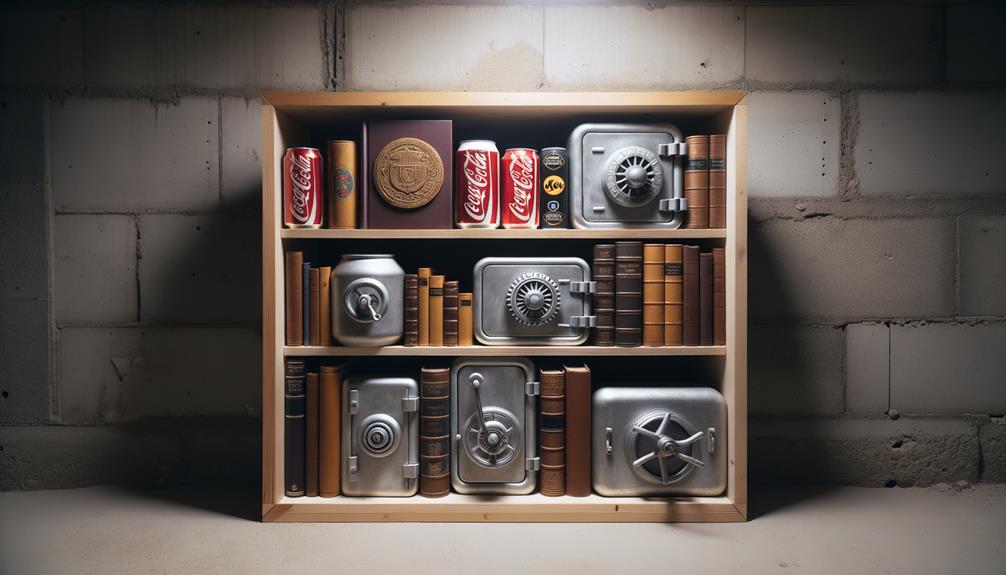
Brainstorm Security Shop

For Orders Over $199

On Any Of Our Products

Details On Refund Page
If you’re seeking a secure way to safeguard your valuables discreetly, diversion safes with key locks might be the solution you’ve been looking for. The added layer of security provided by a key lock system offers peace of mind in shared environments. But have you considered the convenience and accessibility compared to other locking mechanisms? Let’s explore the intricacies of key lock diversion safes and how they can enhance your security measures.
Key lock diversion safes offer enhanced security features compared to non-locking diversion safes, providing an additional layer of protection for your valuables. The increased security provided by a key lock mechanism ensures that only individuals with the correct key can access the contents of the safe, offering you peace of mind knowing that your belongings are secure. This added level of protection is especially beneficial in scenarios where the safe may be located in a shared space or in high-traffic areas, reducing the risk of unauthorized access.
Additionally, key lock diversion safes are designed to deter potential thieves who may be looking for quick and easy targets. The presence of a key lock can act as a visual deterrent, signaling to would-be intruders that breaking into the safe would require more time and effort. This can discourage theft attempts and help safeguard your valuables effectively.

To understand how safes with key locks operate, consider the fundamental mechanisms that enable their secure functionality. Key lock safes rely on a traditional lock and key system for security features. When you insert the key into the lock and turn it, the internal components align to either lock or unlock the safe. This mechanism ensures that only individuals with the correct key can gain access to the contents stored within the safe.
Key storage is a critical aspect of how key lock safes work. The key is typically kept separate from the safe itself, adding an extra layer of security. To access the safe, you must retrieve the key from its designated storage location and use it to unlock the safe. This separation of key storage and safe access helps prevent unauthorized individuals from opening the safe.
In operation, key lock safes provide a straightforward and reliable method of securing your valuables. By understanding the key components and functions of these safes, you can effectively utilize them to protect your belongings.
Understanding the various popular types of diversion safes is crucial for choosing the most suitable option to safeguard your valuables.
When it comes to home security, diversion safes offer a discreet way to store your items. One common type is safes with hidden compartments, blending in seamlessly with everyday items like books, cans, or household products. These safes provide a clever way to keep your valuables hidden in plain sight, deterring potential thieves.
Creative designs are another popular choice for diversion safes. These safes come in various shapes and sizes, resembling objects such as rocks, electrical outlets, or even soda cans. Decoy safes, for example, mimic real products and can easily fool intruders.
Consider important factors such as the size, material, and level of security when choosing a diversion safe for your valuables. When it comes to security features, opt for diversion safes with key locks for added protection. Key locks provide a reliable way to secure your items and deter unauthorized access.
Additionally, look for safes with sturdy construction materials like heavy-duty steel or durable plastic to ensure longevity and resistance to tampering.
In terms of design options, select a diversion safe that blends seamlessly into its surroundings. Common designs include everyday items like books, cans, or household products that discreetly conceal your valuables. Choose a design that fits naturally in the environment where you plan to place the safe to avoid drawing attention.
Furthermore, consider the size of the safe to ensure it accommodates the items you wish to store while remaining inconspicuous. By carefully evaluating security features and design options, you can select a diversion safe that meets your specific needs and provides peace of mind.

When installing a diversion safe with a key lock, ensure that you choose a discreet and secure location that’s easily accessible to you but not obvious to others. Consider mounting options such as bolting the safe to a wall or floor to prevent theft. Make sure the key lock diversion safe is placed in a spot where it blends in with its surroundings, like inside a cabinet or behind books on a shelf.
For key maintenance on key lock safes, periodically lubricate the keyhole with graphite powder to ensure smooth operation. Avoid using oil-based lubricants as they can attract dust and debris, potentially causing malfunctions. Additionally, regularly check the key for any signs of wear or bending. If the key shows signs of damage, replace it promptly to prevent lock issues.
To compare key lock safes with combination lock safes, analyze their respective mechanisms, security features, and ease of operation.
Key lock safes offer a straightforward mechanism where access is granted only with the corresponding key. This provides a quick way to access the safe, but losing the key can lead to being locked out.
On the other hand, combination lock safes require entering a designated code to unlock, eliminating the risk of losing a physical key. However, remembering the code is crucial, and it can be time-consuming to input it each time you want to open the safe.
In terms of security, key lock safes are less susceptible to hacking attempts since they don’t rely on a digital interface that could be compromised. Conversely, combination lock safes may offer more advanced security features like multiple code options and auto-locking mechanisms.
When it comes to ease of operation, key lock safes are generally more user-friendly for individuals who prefer a simple access method, whereas combination lock safes can provide added security but may require more effort in memorizing and inputting the code.

You can purchase key lock diversion safes from specialized security equipment retailers or online platforms that cater to home security needs. When looking for key lock diversion safes, online retailers offer a wide range of options with different pricing options to fit your budget. Websites like Amazon, Home Depot, or dedicated security equipment sites like SafeandVaultStore.com provide a variety of key lock diversion safes to choose from.
Local stores specializing in home security might also carry key lock diversion safes. These stores often provide personalized customer service, allowing you to ask questions and receive recommendations based on your specific needs. Additionally, buying from a local store can offer the benefit of immediate availability and the opportunity to physically inspect the safe before making a purchase.
When purchasing a key lock diversion safe, ensure that the quality assurance measures meet your standards. Check for features like sturdy construction, tamper-resistant locks, and fireproof capabilities to ensure the safety of your valuable items.
In conclusion, key lock diversion safes offer a secure and discreet way to store valuables. With their reliable lock and key system, these safes provide peace of mind and added protection against unauthorized access.
Consider the benefits, types, and factors when choosing a key lock safe for your needs. Remember to follow installation and maintenance tips for optimal security.
Choose key lock diversion safes for enhanced security and peace of mind in storing your valuables.

Brainstorm Security Shop
1867 Caravan Trail
Ste 105
Jacksonville, FL 32216
Call us toll free: (800) 859-5566